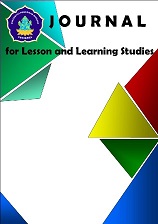Preserving Local Wisdom: A Semiotic Analysis of Lahat's Regional Songs for Character Education
DOI:
https://doi.org/10.23887/jlls.v7i3.87081Keywords:
Folk Songs, Roland Barthez, Media, Character Education, Local WisdomAbstract
The lack of attention to preserving regional songs as a medium of learning based on local wisdom poses challenges in cultural preservation and character education. This study aims to analyze the regional songs of Lahat as representations of local wisdom using Roland Barthes' semiotic approach. The data were analyzed by identifying elements such as lyrics, melody, and musical instruments to uncover the denotative, connotative, and mythological meanings embedded in these songs. The findings reveal that Lahat's regional songs carry profound symbolic meanings, reflecting the social, cultural, and religious values of the local community. The lyrics serve as a medium for conveying moral messages, the melodies provide aesthetic value, while the musical instruments enrich the transmission of traditional knowledge. These findings underscore that Lahat’s regional songs are not merely artistic creations but also valuable cultural heritage with significant potential to support character education. The study concludes by emphasizing the importance of preserving and promoting regional songs as a medium of learning based on local wisdom. This can be achieved by integrating these songs into educational practices to instill cultural and moral values in the younger generation while ensuring the continuity of local traditions.
Published
How to Cite
Issue
Section
License
Copyright (c) 2024 Darwin Effendi, Achmad Wahidy, Riyanto

This work is licensed under a Creative Commons Attribution-ShareAlike 4.0 International License.
Authors who publish with the Journal for Lesson and Learning Studies agree to the following terms:
- Authors retain copyright and grant the journal the right of first publication with the work simultaneously licensed under a Creative Commons Attribution License (CC BY-SA 4.0) that allows others to share the work with an acknowledgment of the work's authorship and initial publication in this journal.
- Authors are able to enter into separate, additional contractual arrangements for the non-exclusive distribution of the journal's published version of the work (e.g., post it to an institutional repository or publish it in a book), with an acknowledgment of its initial publication in this journal.
- Authors are permitted and encouraged to post their work online (e.g., in institutional repositories or on their website) prior to and during the submission process, as it can lead to productive exchanges, as well as earlier and greater citation of published work. (See The Effect of Open Access)




